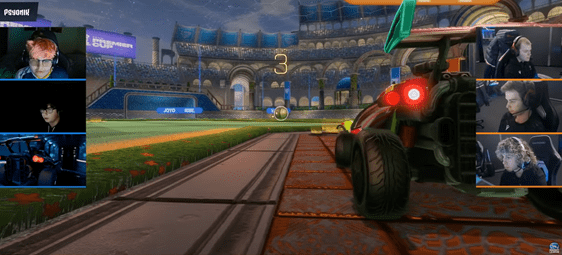Rocket League inherently embodies the playmaking and mental strategy employed by real-world physical sports. The obvious comparison is soccer, however, Rocket League parallels Hockey and even Tennis – sharing similar methodology in decision-making and approach. Experience participating in these sports will undoubtedly transfer to in-game play. Rocket League comms, i.e., RLCS players talking to each other during a match, are an aspect of gameplay I think exposure to sports can have a benefit in.

How to Improve Rocket League Communication
Imagine a soccer player on the pitch; one of eleven. If you’re within earshot, your objective is not to exclaim information about your status to the player with the ball; he is focused on his next move and the opponent positioned directly in front of him. No, your role is to effectively convey what information you have to the player on the ball, as you have a wider few of the pitch and significantly more information at your disposal.
I was a former high-school hockey player, and a practical based approach to communication between teammates was regularly the difference between getting scored on, or scoring. Hockey, like rocket league, is incredibly quick, and talk between players must remain precise as to give your teammate information they can make a decision from in the span of a few nanoseconds.
Callouts like defend right can help a player know what side of the ball to challenge, ultimately positioning your teammates for an ideal follow-up or double team. This is especially helpful when the opposing player is hidden behind the ball.
Similarly, location callouts can give a teammate with time on the ball more options. If their opportunities for play are dwindling as an opponent steps, a callout from a teammate like “quick” can let the man on the ball know the ball must leave his car in the next few moments. Even deciding for a fellow teammate, exclaiming pass while the man on the ball debates going for a solo play or not, is permissible as once again, the information you have off the ball is tenfold your teammate’s.
Understandably, even at the quick pace ice provides, Rocket League far succeeds the speed of most physical sports and esports alike. This makes the aforementioned callouts understandably difficult in execution.
However, a team-based based system for communication is much more practical than the current methods utilized by most professional teams. Listening to comms videos (a very enlightening experience and something I recommend by the way), the over communication readily apparent.
Why Rocket League Comms are Disfunctional
Status updates on boost amounts, bumping callouts on opposing players not relevant to the play, and typical rotation callouts fill the airways; things that despite the level of play, still need to be said?
The callouts themselves are just a symptom of an underlying dysfunctional system. It’s like for example, a mathematician, using a calculator for an elementary multiplication problem.
Your location behind your teammate while he goes up for a solo play will not present any sort of influence on the play, and just serves as a distraction or worse, an interruption; on the contrary, your callout to take the ball low, as you can see the opponent has challenged expecting another ariel hit, could result in a goal.
There are exceptions of course. Boost callouts when you’re getting ready to defend, or rotation callouts when things get confusing will keep you from getting scored on. My point is not that the current methods employ by RLCS teams in entirely unhelpful, simply that it does more harm than good in its current and relatively novel state.
If you disagree, or think more should be done to change the current understanding surrounding in-game Rocket League communication, leave a comment with your thoughts, and check out some of my other opinions here.
